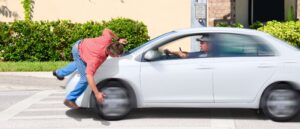Each state has its laws governing what happens in cases of car accidents. Such laws include the responsibilities of motorists, what is required in terms of insurance, and what happens when it comes to compensation that victims of car accidents may be entitled to for damages they have suffered in this context. Accordingly, applicable state laws lay down the provisions concerning who may be held liable for paying such compensation.
Colorado is commonly referred to as an at-fault state (or tort state). As such, it operates a fault-based car insurance system: the driver who causes a car accident and is thus considered at fault will also be responsible for compensating the other party or parties for their losses.
Upholding this financial responsibility, our state has minimum mandatory liability insurance requirements. These cover bodily injuries and damages caused by at-fault drivers in the context of car accidents [1]. In cases where such damages exceed the coverage purchased, or if the driver liable for the accident is uninsured, victims may also explore suing the at-fault driver directly.
Colorado Is a Comparative Fault State
In addition to the above, Colorado is a comparative fault state that applies modified comparative negligence law [2]. So, if it turns out that more than one party is at least partially at fault for an accident, damages will be calculated accordingly. Consequently, the fault and/or negligence of each party involved in an accident, including that of the victim, will be based upon their respective contributions to the accident.
If you are blamed for causing a car accident—or having contributed to it—disputing fault can make a difference when determining liability and compensation obligations. Therefore, you must proceed cautiously and speedily, making sure that you take all necessary steps to reach a fair resolution.
Knowing your rights when it comes to disputing fault is essential. So is receiving professional guidance from an experienced car accident attorney with a proven track record of successfully dealing with similar situations.
Ross Ziev and his team at Legal Help in Colorado are Denver’s premier car crash attorneys dedicated to getting you the justice you deserve. Initial consultations are free and conducted in complete confidence, while they can help you better understand your options.
Liability in Car Accidents
Because of the fault-based system in Colorado, losses arising from a car accident are usually covered by the at-fault driver’s car insurance company up to the driver’s liability coverage limits. These may include both economic and non-economic damages. Depending on the particular circumstances of each case, victims may also receive compensation for the full spectrum of their losses, subject to specific caps set by state law [3].
In exceptional instances, it is even possible for courts to award punitive (or, also called exemplary) damages. This is particularly the case if the person at-fault for the injury acted in a willful and wanton manner [4].
Because of the above, the two most critical aspects of any car accident case are:
- Determining fault
- Ensuring that a claim or lawsuit is filed following all necessary steps and observing all requirements set by law (including time limitations), where the damages sought are accurately calculated and supported by solid evidence.
Determining Fault
Determining who is at fault for an accident may sometimes be entirely clear and, thus, virtually indisputable. For example, rear-end collisions, left-turn car accidents, or car accidents where the police file a report with a clear conclusion on who was at fault for an accident may be less challenging in attributing fault.
Unfortunately, this is not always the case. Car accidents can be complicated matters where many individuals and external factors may be at play and contribute to their occurrence. For instance, a pedestrian who has sustained injuries in the context of a car accident may be found to be partially at fault due to their inattention, poor decision-making, or even illegal activity. Likewise, a presumed at-fault driver may have been affected by poor road conditions, lack of proper traffic control, mechanical issues in their rented car, etc.
Furthermore, given that modified comparative negligence is applicable in Colorado, finding who is liable for a car accident is critical, especially in a civil lawsuit. Per the relevant legislation, our state’s courts reduce plaintiffs’ financial awards by an amount equivalent to their degree of fault for the car accident by application of the notion of 50% modified comparative negligence.
Put simply, if you are 50% or more at fault for the car crash, you will not receive anything for your damages. If, on the other hand, you are 20% liable for your injuries, the total amount of your award will be reduced by 20%. Hence, there can be a massive difference between a plaintiff who is 50% liable for a car accident versus ‘just’ 49% liable.
Essential Steps in Disputing Fault
Following a car accident, the involved insurance companies are typically notified. An insurance agent will investigate what happened with the aim of determining the circumstances of the accident and who was at fault. This process has several aspects and may include:
- Speaking to the individuals directly involved in the accident and with potential witnesses, such as bystanders who may have seen what happened.
- Inspecting the vehicles, the surrounding area, and other properties that may have been affected during the accident, to figure out what happened and under what conditions.
- Retrieving and examining various pieces of evidence, such as the police report, traffic citations, CCTV footage, medical treatment records, etc.
To dispute fault in a car accident, whether you are in the place of the driver liable or the victim contributing to it, you should take certain steps, starting with documenting your case.
Keep Detailed Records
In all car accidents, you should document everything you can at the accident scene, i.e., before the determination of fault by the insurance company. This includes taking pictures of the vehicles, surrounding area, and any other damaged property and resulting injuries. You should also exchange critical information with people such as those involved in the accident, potential witnesses, and the police. Finally, you should get hold of a copy of the police report.
If you have suffered any injury or felt unwell, seek immediate medical assistance and keep a record of all related medical treatment information. This can be very useful should you have to rebut potential claims on the part of the insurance company that you were also partly at fault for delays in getting treatment.
Dealing with the Insurance Company
Once the insurance company determines who is at fault, you should immediately tell them if you disagree with it and feel you have been unfairly blamed. Do so as quickly as possible and make sure to also have this down in writing, whether in the form of a letter or an e-mail, in addition to placing a call. Letting the insurance company know that you are planning to dispute their finding of fault and that you are prepared to take relevant action is what starts by creating a record of your disagreement while giving them a clear indication of your intentions.
Some insurance companies have specific fault dispute processes in place, so make sure to enquire about this. If this is the case, be vigilant about following the right process. They will most likely ask you to offer a statement presenting your side of the story, and provide relevant evidence that may offer a different explanation of what happened, who is responsible, etc.
Effectively, you are embarking on a negotiation process with the insurance company to challenge their findings and dispute their determination regarding your liability for the car accident.
Be aware of your rights and refrain from doing anything or making any statement that could hurt your case if you file a lawsuit further down the line. This is precisely why hiring the services of an experienced car accident attorney who can navigate this process on your behalf without falling for any of the tactics that car insurance adjusters tend to follow, can prove to be invaluable.
Arguing Your case
Even if you make your views available to the insurance company and offer a solid case as to why they should modify their findings, they may still fail to consider this and look into the matter. In this case, you may write to the insurance regulatory body that oversees such matters. In our state, this would be the Colorado Division of Insurance (DOI) [5]. After all, insurance companies must by law act in good faith, and breaching this obligation may give rise to legal action [6].
Another thing you may look into challenging is the findings of the police report if you feel that you have been inaccurately held responsible (or partly responsible) for the accident. For example, you can find the investigating officer and speak to them to present your side of the story, request that they fix any related errors in the report, and give them with your perspective about what happened. All this will be more effective if you can back it up with evidence the police may have missed at the time or not adequately considered.
Lastly, if one of the determining factors the insurance company is relying on in terms of determining fault is the fact that you may have received a traffic ticket in connection with the accident, you must also make sure to dispute it in court. Even if you are not successfully challenging the ticket itself, it will set the tone with them and make it clear that you are taking the matter seriously and willing to fight it any way you can.
Other Considerations to Take into Account
You may file a personal injury claim with the other driver’s insurance company if you find yourself in a car accident for which you believe you were not at fault, even before an insurance company embarks on a fault-finding investigation.
This way, you make your position known and have it on record. Of course, this, alone will not suffice in proving your point. You will still need to collect sufficient evidence to support your view that the accident was the fault of another party.
Remember that disputing fault is not always the best thing to do in such cases and it may not be worth challenging it in some instances.
Each case is unique, and the best course of action will depend on the particular circumstances of your accident and the consequences of being the at-fault party. Having an accurate and dispassionate consideration of the matter is always helpful. This will allow you to weigh the pros and cons of disputing it, thus enabling you to make an informed decision about how to proceed.
Consult an Expert
If you have been involved in a car accident for which you have been determined to be at fault and are contemplating disputing liability, consider getting yourself a lawyer who can support and guide you and represent you in the context of a civil lawsuit.
Our seasoned lawyers at Legal Help in Colorado can help you better understand your case and available options, and answer any questions you may have, so you can choose how you wish to proceed. We do so based on a contingency fee, so you only have to pay us after we successfully handle your case.
If you are considering employing a top-rated car crash attorney, call us at (303) 351-2567 or contact us online to discuss your case in complete confidence.
References
[1] https://leg.colorado.gov/content/mandatory-automobile-insurance-colorado
[2] https://law.justia.com/codes/colorado/2016/title-13/damages-and-limitations-on-actions/article-21/part-1/section-13-21-111
[3] https://law.justia.com/codes/colorado/2016/title-13/damages-and-limitations-on-actions/article-21/part-1/section-13-21-102.5
[4] https://law.justia.com/codes/colorado/2016/title-13/damages-and-limitations-on-actions/article-21/part-1/section-13-21-102
[5] https://doi.colorado.gov/insurance-industry
[6] https://leg.colorado.gov/sites/default/files/images/olls/2008a_sl_422.pdf




